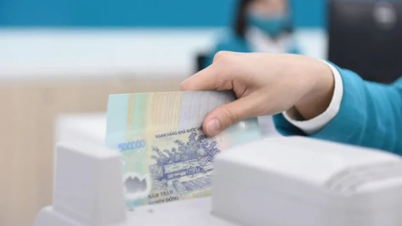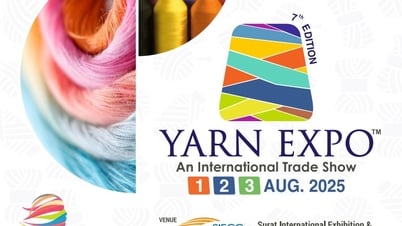The CCCD card is used until it expires and must be changed to an ID card; citizens do not have to pay a fee when being issued an ID card for the first time; there are enough human resources, means, and experience to be able to meet the maximum needs of people when they request to be issued an ID card.
The Law on Identification was passed by the 15th National Assembly at the 6th Session and will come into effect on July 1, 2024, helping to perfect the law, meet the practical requirements of population management, administrative reform, ensure human rights, citizen rights, towards digital government, digital economy , digital society and better serve people and businesses.
One of the important contents of the Law is the conversion of citizen identification cards (CCCD) into identity cards.
Recently, Colonel Vu Van Tan, Deputy Director of the Department of Administrative Police for Social Order, Ministry of Public Security , discussed with the press some contents related to identity cards.
 |
The CCCD card is used until it expires and must be changed to an ID card.
From July 1, the Law on Identification will officially take effect, replacing the Law on CCCD. To comply with the provisions of this Law, how will the Ministry of Public Security implement it, sir?
Colonel Vu Van Tan: From July 1, when the Law on Identification officially takes effect, the Ministry of Public Security will implement the issuance of identification cards in accordance with the provisions of the 2023 Law on Identification and documents guiding the implementation of the Law on Identification.
The Law on Identification stipulates: Citizen identification cards issued before the effective date of the Law on Identification are valid until the expiration date printed on the card. Citizens, when in need, can be issued a replacement for an identity card (Clause 1, Article 46).
Thus, the ID card has the same value as the CCCD card. However, for citizens who are still using the CCCD card with a valid term, they can continue to use it until it expires and then have to change to the ID card, except in cases where citizens need to change from the CCCD card to the ID card.
Cases of issuing and changing ID cards
So, could you please tell us which subjects will have to make and change their cards, and which subjects will not have to change them yet? And this time, how many citizens are expected to be issued and change their new ID cards?
Colonel Vu Van Tan: Cases that must complete procedures for issuing or exchanging ID cards include: Citizens aged 14 and over who have never been issued an ID card or CCCD card; citizens who have had an CCCD card but it has expired. In the case of citizens under 14 years old, citizens with a valid CCCD card will be issued an ID card when they have a need. CCCD cards issued before July 1, 2024 are valid until the expiration date as prescribed.
It is estimated that after the Law on Identification officially takes effect, the Ministry of Public Security will issue identification cards to about 10 million cases each year, including 3 million new cards for citizens of legal age and children in need, 4 million cards for card exchange cases and 3 million cards for re-issuance cases.
However, the Ministry of Public Security predicts that in the first year from July 1, 2024 to July 1, 2025, the number of ID cards issued will be higher because this is the time to start implementing the new regulations, receiving much attention from the people, the ID cards under the new law also have many advantages and a more beautiful and modern appearance...
It is estimated that in the first year, the Ministry of Public Security will issue about 15 million ID cards, including: 5 million new cards for those aged 14 and over and children under 14 who need them; 3 million cards for citizens who are required to change from CCCD cards to ID cards due to expiration; 7 million cards for citizens who need to change from CCCD cards to ID cards.
There will be 2 ID card models
Colonel, this card issuance will have different models for different age groups. Can you provide more information on this issue? Specifically, for cases of card issuance for children aged 0-6, what is noteworthy when making cards for children of this age and what assistance is needed from parents?
Colonel Vu Van Tan: Currently, the Ministry of Public Security is drafting a Circular regulating the form of identity cards and identity certificate in the direction of having two forms of identity cards, including one form for cases from 6 years old and up and one form for cases from 0 to 6 years old (without biometric information of facial photo or fingerprint).
 |
The issuance of ID cards for children aged 0-6 will be done through legal representatives: Legal representatives carry out procedures for issuing ID cards for people under 6 years old through the public service portal or the national identification application (VNeID). In cases where people under 6 years old have not registered their birth, legal representatives carry out procedures for issuing ID cards through procedures linked to birth registration on the public service portal, the national identification application or directly at the ID management agency. The ID management agency does not collect identification information and biometric information for people under 6 years old (Point a, Clause 2, Article 23).
Citizens do not have to pay fees when being issued an ID card for the first time.
One issue that people are particularly interested in and ask a lot of questions on forums is whether there is a fee for issuing and changing cards. Could you please provide more information on this issue?
Colonel Vu Van Tan: Clause 2, Article 38 of the Law on Identification stipulates that “Citizens do not have to pay fees when being issued an identification card for the first time”. Thus, in cases where citizens are issued an identification card for the first time, they do not have to pay fees.
Sufficient human resources, means and experience to be able to meet the maximum needs of people when they request to be issued an ID card.
To ensure the smooth issuance of this card, what plans does the Ministry of Public Security have to avoid people rushing to get cards?
Colonel Vu Van Tan: Basically, all citizens who are 14 years old or older in Vietnam have been issued a CCCD card. Thus, the issuance of ID cards this time is mainly for citizens who are 14 years old or older, cases of changing from CCCD cards to ID cards due to expiration or changes in information; cases of reissuing ID cards due to loss and cases of citizens issuing, exchanging, or reissuing ID cards according to their needs.
The Ministry of Public Security has sufficient human resources, means, and experience to meet the maximum needs of people when they request to be issued identification cards according to the provisions of the 2023 Identification Law.
To effectively implement the issuance of ID cards, in addition to ensuring the necessary conditions for human resources and equipment, the Ministry of Public Security will carry out propaganda work well, have a specific implementation plan, complete software and systems, organize training for officers directly implementing, and coordinate smoothly with units and local authorities.
With the experience of successfully implementing many CCCD card issuance campaigns, the Ministry of Public Security is completely proactive and confident that it will also successfully implement the issuance of ID cards.
Capturing iris information helps ensure highly accurate personal authentication
One of the new points of the Law is that when applying for an ID card, people will have to provide information about their irises. Can you share more about this issue?
Colonel Vu Van Tan: The Law on Identification stipulates that when a citizen applies for an identification card, the identification management agency will collect information about the citizen's iris. Collecting information about the iris helps to quickly provide information to authenticate individuals with high accuracy through devices that do not require physical contact.
Iris recognition is used as one of the biometric data collection methods needed to issue a unique personal identification number. It can be authenticated accurately and quickly even without an ID card. When used in combination with complementary biometric data, such as fingerprints and facial images, it allows for accurate personal authentication, which is resistant to impersonation.
Therefore, collecting information about the iris helps to ensure high accuracy in personal authentication, easy implementation, and deployment of applications to serve the management, crime prevention, and development of the digital economy and digital citizens.
With the mandatory provision of iris information when making an ID card, many people are concerned about the risk of data leakage. In addition, the ID Law also stipulates the collection of DNA and voice into the ID database. Can you tell us more about the benefits of this application?
Colonel Vu Van Tan: Information security and safety issues are deployed and implemented based on international standards and regulations at the highest level of security and encryption, so people can be completely assured that their data will not be leaked or leaked.
The collection of both DNA and voice into the identity database is transferred by the competent authority to the identity management agency or voluntarily provided by citizens. When there is more information about this biometric data, it will better serve the management, tracing, identification work, contributing to effectively supporting the work of state management, population management, crime prevention and control, and the development of the digital economy, digital society, and digital citizens.
According to Chinhphu.vn
Source


































































































Comment (0)